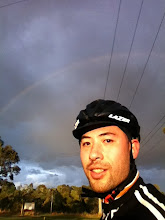Yesterday I ran naked for the first time in way too long. Don't worry. I wasn't jogging nude around the running trails of Melbourne, frightening people. I did something much more radical, and for a lot of runners and triathletes, even more unimaginable. I ran without a GPS, heart rate monitor or mp3 player. I got home and had no data to review. No split times. No "time spent in Zone 3". I have no idea how far I ran, or how fast, and I will never know if I took the Strava CR on Yarra Bend Road.
I realised recently that I, and many people I know have become addicted to data. We endlessly analyse run or ride data and define a "good" workout as one in which we ran fast or beat a previous record (or another Strava user). I can't actually remember the last time I went for a run without having some sort of device attached to my arm to record, track and dissect my performance post-workout.
So yesterday I pulled on my trainers, and headed out the door. I ran the riverside trails around Studley Park, enjoying the morning sun and the beautiful scenery. The sounds of the Australian bush were a rare treat as normally I run with music, and tend to pound across the landscape in a carefully playlisted musical bubble. The bird calls and rush of the river were only interrupted by my own breathing and the staccato beat of my feet hitting the trail. It was peaceful, beautiful and FUN.
I noticed that I was running through the trees with a big grin on my face. I was happy in the moment, completely connected to my own body and my surrounds, and I hadn't had to pay a spiritual guru or life coach for this moment of revelation. I felt freed from worry about how fast I was going, or how much further I needed to run. I was simply enjoying the act of running just like my daughter does. It was running for the joy of it. I ran well. I felt strong, agile and fast and had the feeling that I could run all day.
My little naked run has reminded me that I love to run. I will always be a data nerd. I will always analyse my training to find improvements and I will always compete with myself and others to be the best athlete I can be. I will also make time to regularly run and ride my bike without all of the modern gadgets. It's way more fun and I'm pretty sure it'll make me a better athlete in the long run.
Next time you head out the door to train, stop. Put down your devices and just enjoy your run. You'll be grateful you did.
I realised recently that I, and many people I know have become addicted to data. We endlessly analyse run or ride data and define a "good" workout as one in which we ran fast or beat a previous record (or another Strava user). I can't actually remember the last time I went for a run without having some sort of device attached to my arm to record, track and dissect my performance post-workout.
So yesterday I pulled on my trainers, and headed out the door. I ran the riverside trails around Studley Park, enjoying the morning sun and the beautiful scenery. The sounds of the Australian bush were a rare treat as normally I run with music, and tend to pound across the landscape in a carefully playlisted musical bubble. The bird calls and rush of the river were only interrupted by my own breathing and the staccato beat of my feet hitting the trail. It was peaceful, beautiful and FUN.
I noticed that I was running through the trees with a big grin on my face. I was happy in the moment, completely connected to my own body and my surrounds, and I hadn't had to pay a spiritual guru or life coach for this moment of revelation. I felt freed from worry about how fast I was going, or how much further I needed to run. I was simply enjoying the act of running just like my daughter does. It was running for the joy of it. I ran well. I felt strong, agile and fast and had the feeling that I could run all day.
My little naked run has reminded me that I love to run. I will always be a data nerd. I will always analyse my training to find improvements and I will always compete with myself and others to be the best athlete I can be. I will also make time to regularly run and ride my bike without all of the modern gadgets. It's way more fun and I'm pretty sure it'll make me a better athlete in the long run.
Next time you head out the door to train, stop. Put down your devices and just enjoy your run. You'll be grateful you did.

















